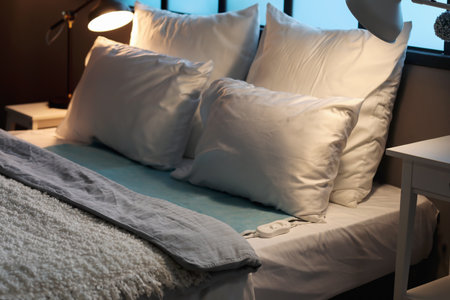Introduction: Changing Attitudes towards Sleep and Wellbeing
In recent years, British society has witnessed a profound transformation in how sleep is perceived and prioritised. No longer dismissed as an afterthought or a luxury for the less industrious, quality rest is now recognised as a vital pillar of overall health and wellbeing. This cultural shift has been propelled by mounting awareness of the stressors embedded in modern urban life—relentless work schedules, digital connectivity that blurs the boundaries between home and office, and the ever-present hum of social media. As the traditional notions of “just getting on with it” give way to a more holistic view of self-care, people across the UK are re-evaluating their nightly routines. The British bedroom, once equipped with little more than blackout curtains and perhaps a hot water bottle, is increasingly becoming a sanctuary dedicated to restorative practices. These evolving attitudes set the stage for a resurgence of interest in natural remedies and time-honoured herbal sleep aids, reflecting both a return to roots and an embrace of integrative approaches aligned with contemporary lifestyles.
2. A Historical Perspective: Herbal Remedies in British Tradition
Long before modern pharmaceuticals filled our bedside tables, herbal remedies held a cherished place in the British approach to sleep and wellbeing. The ancient wisdom of native herbs such as valerian, chamomile, and lavender has been woven into the tapestry of British life—from rural folklore to urban apothecaries. In many traditional villages, elders shared secret recipes for calming teas or aromatic sachets designed to soothe restless minds and encourage restful slumber.
During the Middle Ages, British monasteries were centres of herbal knowledge, with monks cultivating physic gardens rich in sleep-promoting botanicals. By the Victorian era, apothecaries across Britain offered carefully blended tinctures and tonics, drawing on both local flora and imported herbs. These practices reflected a holistic belief that nature’s gentle touch could balance the body’s humours and restore harmony between mind and spirit—a sentiment echoed in today’s integrative wellness culture.
The Enduring Herbs of British Sleep Traditions
| Herb | Traditional Use | Modern Application |
|---|---|---|
| Valerian Root | Infused as tea for insomnia | Pill supplements & teas for sleep support |
| Chamomile | Brewed to calm nerves and aid digestion | Tea bags, essential oils, bath soaks |
| Lavender | Scented pillows for relaxation | Aromatherapy sprays & pillow mists |
The Blend of Past and Present
Today, these time-honoured traditions are experiencing a renaissance within the modern British bedroom. Contemporary wellness enthusiasts increasingly turn towards natural remedies—not just for their efficacy but also for their cultural resonance. By blending folk wisdom with scientific understanding, Britons are rediscovering herbal sleep aids as part of a mindful nightly ritual, honouring both ancestral heritage and present-day needs for balance.
![]()
3. The Influence of Eastern Philosophy and Holistic Practices
In recent years, the British approach to sleep has begun to reflect a deeper appreciation for Eastern philosophies, particularly those rooted in Traditional Chinese Medicine (TCM) and holistic health practices. Once considered alternative or niche, these concepts are now quietly weaving their way into the mainstream, shaping how many Britons think about rest and well-being.
At the heart of TCM lies the belief that sleep is a reflection of overall balance within the body and mind. Rather than simply addressing sleeplessness as an isolated issue, TCM looks at underlying patterns — such as imbalances in yin and yang, disruptions in the flow of Qi, or emotional disturbances impacting the Heart and Shen (spirit). This perspective resonates with a growing number of people in the UK who seek to address root causes rather than merely suppress symptoms.
The Shift Towards Mind-Body Integration
One clear sign of this cultural shift is the increasing popularity of herbal remedies that support not just physical relaxation but also emotional harmony. British consumers are becoming more discerning, looking for solutions that foster both calmness of mind and restoration of body. Herbs like chamomile and valerian are now joined by traditional Eastern botanicals such as jujube seed, schisandra berry, and magnolia bark—each selected for their ability to gently harmonise the bodys natural rhythms.
Embracing Rituals Over Quick Fixes
This holistic ethos extends beyond what is consumed; it encompasses rituals around sleep itself. Inspired by Eastern nightly routines—such as mindful tea ceremonies or gentle acupressure—British households are creating bedtime environments that honour tranquillity. Soft lighting, calming scents like lavender or sandalwood, and even practices like guided breathing or meditation are gaining ground as essential parts of preparing for restorative slumber.
Cultural Exchange and Adaptation
The British embrace of TCM principles does not mean wholesale adoption without adaptation. Instead, there is an ongoing dialogue between ancient wisdom and modern lifestyle needs. For example, while traditional decoctions may be unfamiliar, convenient herbal teas or tinctures formulated with both Western and Eastern herbs have found their way onto supermarket shelves across the UK. This fusion reflects a uniquely British approach: pragmatic yet open-minded, respectful of tradition yet keen on innovation.
Ultimately, the integration of Eastern philosophy into British sleep culture marks a subtle but significant transformation. By valuing harmony between mind and body—and by seeing sleep as an opportunity for holistic renewal—the modern British bedroom is evolving into a space where East meets West in pursuit of healthier rest.
4. Modern Lifestyles and the Sleep Crisis
In recent years, the British approach to sleep has undergone remarkable transformation, mirroring broader cultural shifts. The growing prevalence of technology, increased work pressures, and rapid urbanisation have contributed to a national sleep crisis. Our modern lifestyles are now at the centre of this discussion, as more people in the UK report difficulties falling asleep or staying asleep through the night.
The Impact of Screen Time
One of the most significant contributors to poor sleep quality is the rise in screen time. From smartphones and tablets to laptops and televisions, Britons are spending more hours than ever before exposed to blue light-emitting devices. This artificial light interferes with the body’s natural circadian rhythms, making it harder for individuals to wind down at bedtime.
Work Stress and Urban Pressures
Beyond technology, work-related stress continues to be a dominant force shaping British sleep patterns. Extended office hours, commuting challenges, and the increasing expectation of being constantly reachable have blurred the lines between work and personal life. Meanwhile, rapid urbanisation has brought about environmental noise, light pollution, and smaller living spaces—all factors that disturb peaceful slumber.
Modern Lifestyle Factors Affecting Sleep Quality
| Lifestyle Factor | Typical Impact on Sleep | British Cultural Context |
|---|---|---|
| Screen Time | Disrupted melatonin production; difficulty falling asleep | High device usage before bed; common among all age groups |
| Work Stress | Increased anxiety; insomnia; fragmented sleep | Expectation to remain available for emails/calls after hours |
| Urban Living | Noisy environment; exposure to city lights; less restorative sleep | Majority of population in cities like London, Manchester, Birmingham |
The Shift Towards Natural Solutions
As these pressures mount, many Britons are looking for ways to restore balance without resorting to pharmaceuticals. There is a growing curiosity about natural remedies—particularly herbal sleep aids—that align with both Western wellness trends and traditional holistic wisdom. This shift represents not just a response to sleeplessness but a desire for greater harmony between body and mind amidst modern chaos.
5. Rise of Herbal Sleep Aids: Trends, Brands, and Consumer Behaviour
In recent years, the British market has witnessed a significant transformation in sleep aid preferences, with an increasing number of individuals turning towards herbal solutions. This trend is not simply a fleeting fashion but reflects deeper cultural shifts, where holistic well-being and natural remedies are gaining prominence over synthetic alternatives.
Market Trends: From Pharmaceuticals to Botanicals
The modern British consumer has become more discerning about what they put into their bodies, especially concerning sleep aids. The decline in trust towards synthetic sleeping pills—often associated with dependency and side effects—has paved the way for herbal remedies derived from centuries-old traditions, including those rooted in Traditional Chinese Medicine (TCM) and European herbalism. Ingredients such as valerian root, chamomile, lavender, and passionflower are now commonly found in British bedrooms, either as teas, tinctures, capsules, or essential oils.
Popular Local Brands Leading the Shift
Several homegrown brands have emerged as champions of this movement. Companies like Pukka Herbs and Heath & Heather have carved out a reputable niche by offering organic, ethically sourced herbal blends specifically designed for relaxation and sleep. These brands often highlight transparency in sourcing and production, resonating with eco-conscious British consumers who value sustainability alongside efficacy.
Consumer Preferences: Seeking Balance and Harmony
The shift towards herbal sleep aids is closely tied to the British inclination for balance and moderation—a reflection of both cultural values and the growing influence of mind-body philosophies. Consumers increasingly seek products that do not just induce sleep but promote holistic restfulness, integrating mindfulness practices such as evening meditation or gentle yoga with their nightly routines. Packaging aesthetics, clear labelling, and educational resources also play a role in shaping purchasing decisions.
Moving Beyond Synthetic Solutions
This evolving landscape suggests a broadening understanding of health that transcends mere symptom relief. The embrace of herbal sleep aids signifies a desire to harmonise body and mind naturally, echoing TCM principles that view sleep disturbances as imbalances within the whole system rather than isolated issues. As these trends continue to shape the modern British bedroom, it becomes evident that the future of sleep health lies in reconnecting with natures wisdom while maintaining the uniquely British spirit of gentle self-care.
6. Mind-Body Balance: Practical Guidance on Integrating Herbal Aids
In the evolving landscape of British sleep culture, the integration of herbal remedies into nightly routines has become both an art and a science. Striking a harmonious balance between mind and body is at the heart of this shift, echoing the holistic ethos long championed by traditional Chinese medicine. Here’s how you can thoughtfully weave herbal sleep aids into your bedtime ritual, respecting both contemporary scientific understanding and age-old wisdom.
Respect Your Rhythm: Timing and Consistency
Begin by establishing a consistent bedtime, mirroring nature’s cycles—something that both modern sleep science and ancient tradition advocate. About half an hour before bed, consider sipping a cup of chamomile or valerian root tea. These herbs are cherished in Britain for their calming properties and have been supported by studies for their gentle sedative effects.
Create a Ritual: The Power of Intention
Transforming the act of taking herbal remedies into a mindful ritual can deepen their impact. As you prepare your infusion, take slow breaths and set an intention for restful sleep. This conscious preparation aligns with practices in both British folklore and Eastern philosophies, fostering a sense of calm that primes your body for slumber.
Blending Tradition with Science
While lavender sachets placed under pillows are a beloved British tradition, their soothing aroma also has evidence-based support for reducing anxiety and improving sleep quality. Try integrating aromatherapy alongside your herbal teas or tinctures to create a multi-sensory approach to relaxation.
Personalisation: Listening to Your Body
No two individuals respond identically to herbal remedies. Start with small doses and observe how your body reacts over several nights. British herbalists often recommend keeping a sleep journal—jotting down which herbs you try, your mood, and sleep quality—to help tailor your approach.
Safety First: Consult with Professionals
Though herbs are natural, they can interact with medications or underlying health conditions. Consult with a qualified practitioner—whether it’s your GP or a registered medical herbalist—especially if you’re new to these remedies. This respect for safety echoes the cautious yet open-minded spirit now shaping British wellness culture.
Cultivating Harmony in the Modern Home
Ultimately, integrating herbal sleep aids is about more than just chasing better rest—it’s about nurturing harmony between mind and body, tradition and innovation. By approaching these remedies with curiosity, respect, and mindfulness, modern Britons can create evening rituals that honour both heritage and health.
7. Conclusion: The Future Outlook of Herbal Sleep Culture in Britain
The growing embrace of herbal sleep aids in the British bedroom is more than a fleeting trend; it signals a profound shift towards a holistic approach to wellbeing that honours both tradition and contemporary needs. As modern Britons increasingly seek harmony between mind and body, the reliance on nature’s remedies—such as valerian, chamomile, and lavender—reflects a collective yearning to restore balance in an ever-accelerating world. This cultural transformation is not only redefining nightly routines but also reshaping public attitudes toward self-care and health.
Reconnecting with Tradition Amidst Modernity
Britain’s renewed interest in herbal sleep solutions draws inspiration from centuries-old wisdom, yet it is firmly rooted in today’s context of scientific inquiry and individual empowerment. The integration of these remedies into daily life suggests an ongoing dialogue between ancestral knowledge and modern living, where people are encouraged to experiment mindfully, honouring both evidence and intuition.
The Role of Community and Education
As herbal sleep culture continues to flourish, there is a growing emphasis on community support and accessible education. Health practitioners, local wellness shops, and online forums are playing vital roles in sharing trustworthy information, fostering collective learning, and dispelling misconceptions. This collaborative spirit is nurturing a more informed and empowered society, ready to make conscious choices for their long-term wellbeing.
Looking Ahead: The Evolution of British Sleep Habits
The future promises further integration of herbal wisdom into mainstream health practices, bridging gaps between conventional medicine and natural therapies. In the years to come, we can expect continued innovation in product development, research on efficacy and safety, and deeper conversations about sustainable sourcing. Ultimately, Britain’s evolving sleep culture reflects a broader movement towards holistic harmony—an aspiration not just for better sleep, but for a richer quality of life rooted in mindful self-care.


